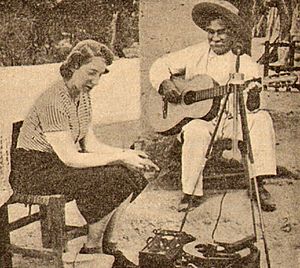Isabel Aretz facts for kids
Isabel Aretz (born April 14, 1909 – died June 2, 2005) was an amazing researcher, writer, and composer from Argentina and Venezuela. She was also an ethnomusicologist, which means she studied music from different cultures around the world.
Contents
Isabel Aretz's Early Life
Isabel Aretz was born in Buenos Aires, Argentina. She loved music from a young age and studied at the National Conservatory of Music and Performing Arts. There, she learned to play the piano and how to compose music. Later, in 1968, she earned a special degree called a doctorate in music.
Her Career and Discoveries
After finishing her studies, Isabel Aretz became a teacher at the National Conservatory. She also started her important work as an ethnomusicologist and composer. In 1937, her orchestral piece called Punto was performed for the first time.
Over the next ten years, she traveled a lot to collect and record traditional music. She visited countries like Argentina, Paraguay, Uruguay, Chile, Bolivia, and Peru. She wanted to learn about the unique sounds and songs of each place.
In 1947, she married Luis Felipe Ramón y Rivera, who was also a musician and writer from Venezuela. That same year, she was asked to help create a music section for the Folklore Research Service in Venezuela. She continued her research into folk music there. In 1966, she received a special award called a Guggenheim Fellowship. This helped her travel to Mexico, Colombia, Ecuador, and Central America to record more native melodies.
Isabel Aretz founded the American Institute of Ethnomusicology and Folklore (INIDEF) in Venezuela. She led this important organization from 1990 to 1995. She also taught ethnomusicology at the Central University of Venezuela and at Indiana University in the United States. She was a guest teacher at other universities too.
Isabel Aretz wrote many articles and about 25 books about American folklore. She also wrote a book about her own life. After her husband passed away in 1992, she became a member of the Academy of Arts and Sciences in Argentina. She moved back to San Isidro and continued her work until she passed away in June 2005.
Awards and Special Honors
Isabel Aretz received many awards for her amazing work, including:
- The Order of Andrés Bello from the Government of Venezuela.
- The National Music Prize "José Angel Lamas."
- The First Prize for Musicology from the National Endowment for the Arts.
- She was named an Emeritus member of the Argentina Academy of Music in 1999.
- She was recognized as a Master Teacher by the Catholic University of Valparaiso in 2000.
- The Gabriela Mistral International Prize of Arts and Music, given by the Organization of American States (OAS).
- The Robert Stevenson International Musicological Award for her research in ethnomusicology.
Musical Compositions
Isabel Aretz created many different types of musical works. She wrote pieces for orchestras, symphonies, and choirs. She also composed music for piano and harpsichord. Some of her well-known works include:
- Puneñas: First performed in Buenos Aires.
- Páramo: A ballet that premiered in Venezuela.
- Jew's harp: First performed at a festival in Mérida, Venezuela.
- Yekuana: Premiered in Venezuela.
- Argentina to death: An orchestral work based on a poem, first performed in Caracas.
- Kwaltaya: An ethnodrama (a play with ethnic music) that premiered in Caracas.
- Constellation spectral: A symphony first performed by the Municipal Symphony Orchestra.
- Father Liberator: A symphonic and choral work, premiered at the American Music Festival in Washington.
- Cries of a city: Released in New York.
- Cosmos man: Works for piano and tape, released in New York.
See also
 In Spanish: Isabel Aretz para niños
In Spanish: Isabel Aretz para niños
 | James B. Knighten |
 | Azellia White |
 | Willa Brown |


